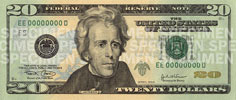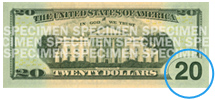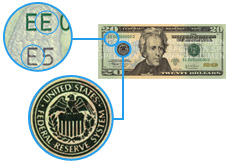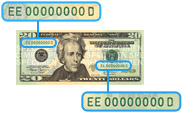Currency index
Advertisements
United States twenty dollar bill

Description:
Size: 155.956 x 66.294 mm
Paper type: 75% cotton, 25% linen


The Twenty US dollar bill ($20) is a
denomination of United States currency. U.S. President Andrew Jackson is
currently featured on the front side of the bill, which is why the twenty-dollar
bill is often called a "Jackson," while the White House is featured on the reverse side.
The twenty-dollar bill in the past was referred to as a "double-sawbuck"
because it is twice the value of a ten-dollar bill, which was nicknamed a
"sawbuck" due to the resemblance the Roman numeral for ten (X) bears to the legs
of a sawbuck, although this usage had largely fallen out of favor by the 1980s.
The twenty dollar gold coin was known as a "double eagle". Rather than a
nickname, this nomenclature was specified by an act of Congress.
The Bureau of Engraving and Printing says the average circulation life of a Twenty US dollar bill
($20) is 25 months (2 years) before it is replaced due to wear. Approximately
30% of all notes printed in 2014 were $20 bills. Twenty-dollar bills are
delivered by Federal Reserve Banks in violet straps.
Security Features:
Security features can help you to tell if a 20 dollar bill is fake or real.
Color-Shifting Ink

Tilt your twenty dollar note to see if the numeral 20 in the lower right corner on the front of the
bill changes color from copper to green. The color shift is more dramatic in
the redesigned currency, making it easier for people to check their money.
Watermarks

Hold the bill to light and look for the watermark, or faint image, similar to the large portrait.
The watermark is part of the paper itself and can be seen from both sides of the bill.
Security Thread

Hold the twenty dollar note to light and look for the security thread
that is embedded in the paper and runs vertically up one side of the bill. If
you look closely, the words USA TWENTY and a small flag are visible
along the thread from both sides of the bill. The security thread glows green
when illuminated by ultraviolet light.
The redesigned currency remains the same size and uses the same, but enhanced portraits and historical images as the older-design bills, and importantly, continues to be recognized around the world as quintessentially American.
Symbols of Freedom

Appearing on the front of the bill are two American
eagle symbols of freedom. The large blue eagle in the background to the left of
President Andrew Jackson's portrait is representative of those drawn and
sculpted during his time period. The smaller green metallic eagle to the lower
right of the portrait is a more contemporary illustration, using the same raised
ink intaglio process as the portrait, numerals and engravings. The symbols of
freedom differ for each denomination.
Updated Portrait and Vignette

The numeral 20 in the lower right corner
on the back of the Twenty dollar note is enlarged to help those with visual impairments distinguish the denomination.
Low-Vision Feature

The numeral 20 in the lower right corner
on the back of the Twenty dollar note is enlarged to help those with visual impairments
distinguish the denomination.
Microprinting

Because they are so small, microprinted words are hard to replicate.
The redesigned $20 bill features microprinting on the front of the bill in two areas:
bordering the first three letters of the TWENTY USA ribbon to the right of the
portrait, the inscription USA20 is printed in blue. THE UNITED STATES OF AMERICA 20 USA 20 appears in
black on the border below the Treasurer's signature.
Federal Reserve Indicators

A universal seal to the left of the portrait represents the entire Federal Reserve System. A letter and number beneath the
left serial number identifies the issuing Federal Reserve Bank. There are 12
regional Federal Reserve Banks and 24 branches located in major cities throughout the United States.
Serial Numbers

The unique combination of eleven numbers and letters appears twice on the front of the bill. Because they are unique identifiers,
serial numbers help law enforcement identify counterfeit notes, and they also
help the Bureau of Engraving and Printing track quality standards for the notes they produce.
Check this video of two fake 20 dollar bills
In this video you can see two fake twenty dollar bills compared to a real one
Sources:
uscurrency.gov
wikipedia.org











Follow currencyguide.eu